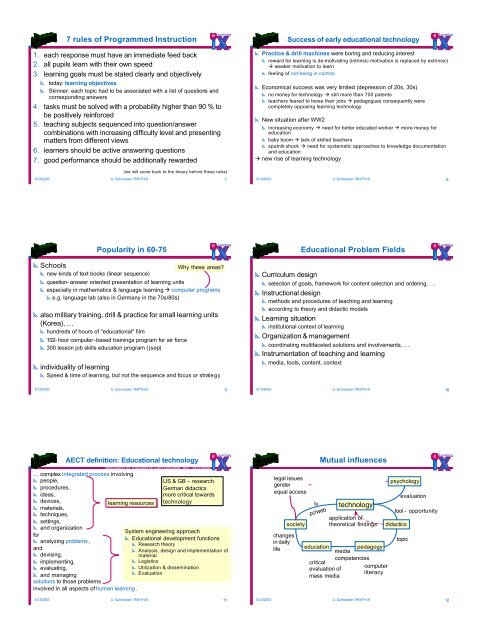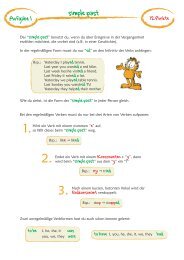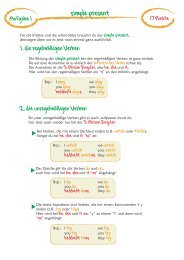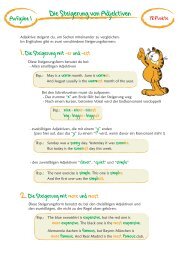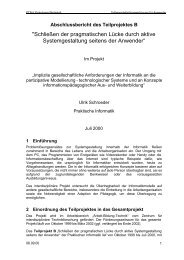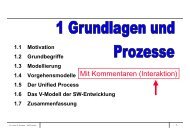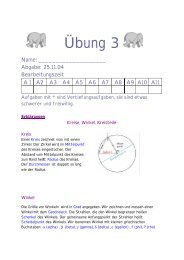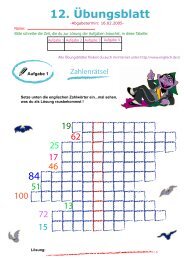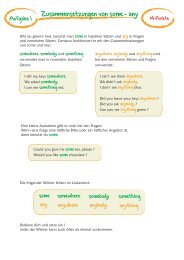Objectives / Topics History of Learning Machines History of ... - LuFG i9
Objectives / Topics History of Learning Machines History of ... - LuFG i9
Objectives / Topics History of Learning Machines History of ... - LuFG i9
You also want an ePaper? Increase the reach of your titles
YUMPU automatically turns print PDFs into web optimized ePapers that Google loves.
7 rules <strong>of</strong> Programmed Instruction<br />
e <strong>Learning</strong><br />
1. each response must have an immediate feed back<br />
2. all pupils learn with their own speed<br />
3. learning goals must be stated clearly and objectively<br />
y today: learning objectives<br />
y Skinner: each topic had to be associated with a list <strong>of</strong> questions and<br />
corresponding answers<br />
4. tasks must be solved with a probability higher than 90 % to<br />
be positively reinforced<br />
5. teaching subjects sequenced into question/answer<br />
combinations with increasing difficulty level and presenting<br />
matters from different views<br />
6. learners should be active answering questions<br />
7. good performance should be additionally rewarded<br />
(we will come back to the theory behind these rules)<br />
5/13/2003 U. Schroeder / RWTH <strong>i9</strong> 7<br />
Popularity in 60-75<br />
ySchools<br />
ynew kinds <strong>of</strong> text books (linear sequence)<br />
5/13/2003 U. Schroeder / RWTH <strong>i9</strong> 9<br />
RWTH<br />
L u F G<br />
e <strong>Learning</strong><br />
yquestion-answer oriented presentation <strong>of</strong> learning units<br />
yespecially in mathematics & language learning computer programs<br />
ye.g. language lab (also in Germany in the 70s/80s)<br />
yalso military training, drill & practice for small learning units<br />
(Korea), …<br />
yhundreds <strong>of</strong> hours <strong>of</strong> "educational" film<br />
y102-hour computer-based trainings program for air force<br />
y300 lesson job skills education program (jsep)<br />
yindividuality <strong>of</strong> learning<br />
ySpeed & time <strong>of</strong> learning, but not the sequence and focus or strategy<br />
AECT definition: Educational technology<br />
… complex integrated process involving<br />
y people,<br />
y procedures,<br />
y ideas,<br />
y devices,<br />
y materials,<br />
y techniques,<br />
y settings,<br />
y and organization<br />
for<br />
y analyzing problems ,<br />
and<br />
y devising,<br />
y implementing,<br />
y evaluating,<br />
y and managing<br />
solutions to those problems<br />
involved in all aspects <strong>of</strong> human learning.<br />
RWTH<br />
L u F G<br />
Why these areas?<br />
association for Educational Communication and Technology<br />
learning resources<br />
e <strong>Learning</strong><br />
5/13/2003 U. Schroeder / RWTH <strong>i9</strong> 11<br />
RWTH<br />
US & GB – research<br />
German didactics<br />
more critical towards<br />
technology<br />
System engineering approach<br />
y Educational development functions<br />
y Research theory<br />
y Analysis, design and implementation <strong>of</strong><br />
material<br />
y Logistics<br />
y Utilization & dissemination<br />
y Evaluation<br />
L u F G<br />
Success <strong>of</strong> early educational technology<br />
e <strong>Learning</strong><br />
y Practice & drill machines were boring and reducing interest<br />
y reward for learning is de-motivating (intrinsic motivation is replaced by extrinsic)<br />
weaker motivation to learn<br />
y feeling <strong>of</strong> not being in control<br />
y Economical success was very limited (depression <strong>of</strong> 20s, 30s)<br />
y no money for technology still more than 700 patents<br />
y teachers feared to loose their jobs pedagogues consequently were<br />
completely opposing learning technology<br />
y New situation after WW2<br />
y increasing economy need for better educated worker more money for<br />
education<br />
y baby boom lack <strong>of</strong> skilled teachers<br />
y sputnik shock need for systematic approaches to knowledge documentation<br />
and education<br />
new rise <strong>of</strong> learning technology<br />
5/13/2003 U. Schroeder / RWTH <strong>i9</strong> 8<br />
Educational Problem Fields<br />
yCurriculum design<br />
yselection <strong>of</strong> goals, framework for content selection and ordering, …<br />
yInstructional design<br />
ymethods and procedures <strong>of</strong> teaching and learning<br />
yaccording to theory and didactic models<br />
y<strong>Learning</strong> situation<br />
yinstitutional context <strong>of</strong> learning<br />
yOrganization & management<br />
ycoordinating multifaceted solutions and involvements, …<br />
yInstrumentation <strong>of</strong> teaching and learning<br />
ymedia, tools, content, context<br />
5/13/2003 U. Schroeder / RWTH <strong>i9</strong> 10<br />
legal issues<br />
gender<br />
equal access<br />
society<br />
tv<br />
pc/web<br />
Mutual influences<br />
technology<br />
application <strong>of</strong><br />
theoretical findings<br />
changes<br />
in daily<br />
life education<br />
media<br />
pedagogy<br />
competencies<br />
critical<br />
evaluation <strong>of</strong><br />
computer<br />
literacy<br />
mass media<br />
psychology<br />
didactics<br />
evaluation<br />
topic<br />
RWTH<br />
L u F G<br />
e <strong>Learning</strong><br />
5/13/2003 U. Schroeder / RWTH <strong>i9</strong> 12<br />
RWTH<br />
L u F G<br />
e <strong>Learning</strong><br />
RWTH<br />
tool - opportunity<br />
L u F G


